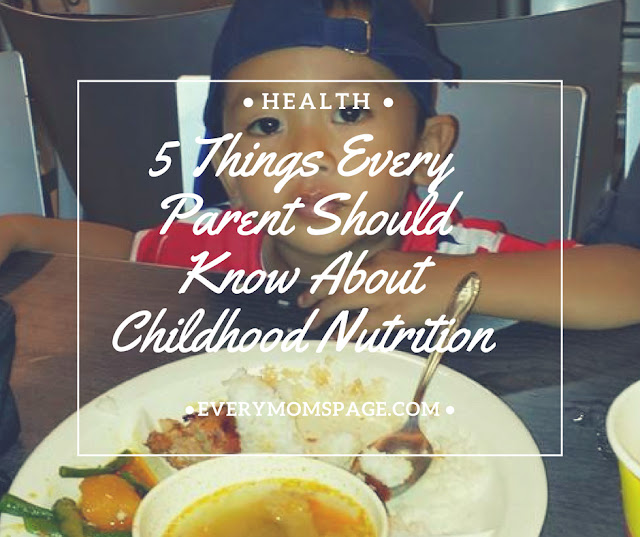5 Things Every Parent Should Know About Childhood Nutrition
Every parent worries about whether their kids are getting enough of the right nutrients. But with so much conflicting information on nutrition, how do we know what’s legit?
The answer is simple. Although there are fads and foods that fall in and out of favor, the rules of nutrition haven’t changed much in the past few decades. In fact, the only thing that has drastically changed is our food supply.
With that in mind, pay close attention to these five things every parent should know about nutrition. 1. Moderation is key
You may want to be that parent who never lets her child have sugar or bacon, but then you see the tears well up in her eyes at a birthday party and you cave. It’s extremely difficult to avoid all the “fun foods” that are so closely related to childhood (think ice cream and cotton candy).
You don’t have to be the mean parent, but you can limit your child’s intake of sugary and fatty foods. It’s best if you can start this from a very young age. Teach your child that these foods are treats. As such, they should only be enjoyed occasionally.
And as a bonus, your child will learn to appreciate these foods more than their free-snacking friends. This can carry into adulthood and help your child make healthy choices throughout his or her life.
2. Whole foods are most important
You don’t have to delve into the nitty-gritty of diet planning for your child. Getting kids to eat their broccoli is hard enough! Instead, just fill their plates with whole foods that come straight from nature. The closer to nature, the better. These foods include fresh fruits, vegetables, and lean, farm-raised animal products.
And as a bonus, your child will learn to appreciate these foods more than their free-snacking friends. This can carry into adulthood and help your child make healthy choices throughout his or her life.
2. Whole foods are most important
You don’t have to delve into the nitty-gritty of diet planning for your child. Getting kids to eat their broccoli is hard enough! Instead, just fill their plates with whole foods that come straight from nature. The closer to nature, the better. These foods include fresh fruits, vegetables, and lean, farm-raised animal products.
It’s not as easy to use whole foods because they require preparation, but it’s definitely worthwhile. Children need a good foundation of vitamins and minerals, and it’s best to get these from whole foods.
3. Kids will follow your example
You can tell your kids to eat their cauliflower, but if you’re eating fries instead, they’re going to want what you have. The same holds true if you’re downing a pint of ice cream and limiting them to one scoop. Eventually, they’ll see what you’re doing and want to do the same.
4. Drinks can spoil your efforts
You can feed your child all organic fruits and vegetables, but if he’s drinking empty calories, you’re doing him a disservice. Your child may or may not gain weight from sugary drinks because a child’s metabolism is much better than an adult’s. But if your child gets in the habit of drinking and eating junk, it could eventually lead to diabetes later in life. It’s better to get your kids in the habit of drinking water ,or watered-down, juice.
Even if a juice was made completely from fruit, it will have all of the sugar and none of the fiber from that fruit. Fiber slows down sugar absorption, so it’s less problematic.
5. Our society encourages poor choices
When you go out to eat with the kids, what’s on the menu? It’s typically filled with poor nutritional choices like hot dogs, pizza and fried chicken fingers. But you should know that you don’t have to stick to the kid’s menu just because you have kids.
If you want your kids to have a healthy meal while you’re out, consider building a meal from side dishes and/or appetizers. You’ll probably find your child’s favorite veggie listed, and it’ll be better than the old-standby mac and cheese.
Pro tip: You can even sometimes do this at fast food joints.
If you take anything away from reading this post, let it be this: Nutrition isn’t difficult or confusing. You don’t need a degree to figure it out, and you don’t need to get your cues from the latest study featured on the nightly news.
Eating healthy enhances the mind and body, so it’s worth making a few simple swaps to help give your kids the best head start.
3. Kids will follow your example
You can tell your kids to eat their cauliflower, but if you’re eating fries instead, they’re going to want what you have. The same holds true if you’re downing a pint of ice cream and limiting them to one scoop. Eventually, they’ll see what you’re doing and want to do the same.
4. Drinks can spoil your efforts
You can feed your child all organic fruits and vegetables, but if he’s drinking empty calories, you’re doing him a disservice. Your child may or may not gain weight from sugary drinks because a child’s metabolism is much better than an adult’s. But if your child gets in the habit of drinking and eating junk, it could eventually lead to diabetes later in life. It’s better to get your kids in the habit of drinking water ,or watered-down, juice.
Even if a juice was made completely from fruit, it will have all of the sugar and none of the fiber from that fruit. Fiber slows down sugar absorption, so it’s less problematic.
5. Our society encourages poor choices
When you go out to eat with the kids, what’s on the menu? It’s typically filled with poor nutritional choices like hot dogs, pizza and fried chicken fingers. But you should know that you don’t have to stick to the kid’s menu just because you have kids.
If you want your kids to have a healthy meal while you’re out, consider building a meal from side dishes and/or appetizers. You’ll probably find your child’s favorite veggie listed, and it’ll be better than the old-standby mac and cheese.
Pro tip: You can even sometimes do this at fast food joints.
If you take anything away from reading this post, let it be this: Nutrition isn’t difficult or confusing. You don’t need a degree to figure it out, and you don’t need to get your cues from the latest study featured on the nightly news.
Eating healthy enhances the mind and body, so it’s worth making a few simple swaps to help give your kids the best head start.



